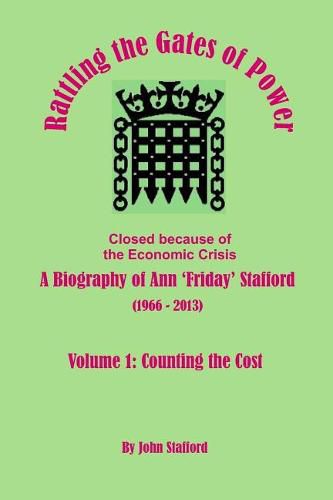Readings Newsletter
Become a Readings Member to make your shopping experience even easier.
Sign in or sign up for free!
You’re not far away from qualifying for FREE standard shipping within Australia
You’ve qualified for FREE standard shipping within Australia
The cart is loading…






When powerful politicians and big business chose competition over compassion to introduce a new economic regime and propagate it world wide with missionary zeal, the effects were devastating for people in many countries, not only those in the third world. Ann Stafford followed the social cost of these neoliberal policies with growing unease. Many highly intelligent, well educated and very competent people joined existing or formed new social, political, economic and environmental global justice movements to warn, to challenge and to take action. Ann was one of these, and her story is a part history of these turbulent times with first hand accounts of European protest events, particularly at world leader summits, Given her background, she was predestined to take an international viewpoint and keenly observed the economic depredations in the third world, particularly in Central and Latin America. The seeds that grew into the formation of Peoples’ Global Action, one of the most innovative and influential global justice movements, were sown there. Ann played a significant role in this movement and the details of its development are vividly brought to life. Highlights in volume one of this biography include her participation in the events surrounding the International Monetary Fund conference in Madrid 1994, the ‘Greenhouse Gathering’ at the Berlin Climate Conference in Berlin 1995, the Women’s Conference in Beijing 1995, the World Food Conference in Rome 1996 and the World Trade Organisation in Geneva 1998. Ann also recorded the changes in attitude towards the financially vulnerable in the developed world and was also concerned with local issues in Germany, especially Berlin, her adopted home. She was a witness to and left vivid accounts of the tumultuous changes in East German public institutions after the fall of the Berlin Wall, with particular reference to the Humboldt university. The biography is illustrated with many photographs
$9.00 standard shipping within Australia
FREE standard shipping within Australia for orders over $100.00
Express & International shipping calculated at checkout
When powerful politicians and big business chose competition over compassion to introduce a new economic regime and propagate it world wide with missionary zeal, the effects were devastating for people in many countries, not only those in the third world. Ann Stafford followed the social cost of these neoliberal policies with growing unease. Many highly intelligent, well educated and very competent people joined existing or formed new social, political, economic and environmental global justice movements to warn, to challenge and to take action. Ann was one of these, and her story is a part history of these turbulent times with first hand accounts of European protest events, particularly at world leader summits, Given her background, she was predestined to take an international viewpoint and keenly observed the economic depredations in the third world, particularly in Central and Latin America. The seeds that grew into the formation of Peoples’ Global Action, one of the most innovative and influential global justice movements, were sown there. Ann played a significant role in this movement and the details of its development are vividly brought to life. Highlights in volume one of this biography include her participation in the events surrounding the International Monetary Fund conference in Madrid 1994, the ‘Greenhouse Gathering’ at the Berlin Climate Conference in Berlin 1995, the Women’s Conference in Beijing 1995, the World Food Conference in Rome 1996 and the World Trade Organisation in Geneva 1998. Ann also recorded the changes in attitude towards the financially vulnerable in the developed world and was also concerned with local issues in Germany, especially Berlin, her adopted home. She was a witness to and left vivid accounts of the tumultuous changes in East German public institutions after the fall of the Berlin Wall, with particular reference to the Humboldt university. The biography is illustrated with many photographs